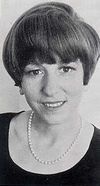 Speaker: by Mrs Lore Parker
Speaker: by Mrs Lore Parker
Vice President & Copy-Supervisor, DDB(1966)
The account assignments are quite democratic. An Art Supervisor V.P. may work with a plain copywriter. Or an Associate Copy Chief with a simple Art Director. All that matters is how suitable and available each member of the team is for the job.
Once an account has been assigned to a team, it is "theirs". Their responsibility and their satisfaction alone. Many agencies put a whole slew of creative people to work on a problem, each one competing with everyone else. This leads to the attitude: "The chances that my campaign will win very slight. So why should I put my heart and soul into it?"
We sometimes interview writers who have worked somewhere for a year and have never had anything published. There are, of course, terribly frustrated.
At DDB we know that each one of us is solely responsible for the accounts assigned to us. All of it --- print, television, outdoor.
There are no "print writers" or "television writers". If an account is too large to be handled by one team, it is usually broken up by a product. As, for instance, the VW Station wagon is handled by different team from the VW Sedan. So our dedication in which we work.
Now what happens? Go the copywriter and art director sit down together and "create"? Not yet. First they must get to know their product, their client, their market, their audience, the client's problems and aims. A campaign like Avis' "We are No.2, so we try harder" could never have been done unless the creative people had been thoroughly familiar vith Avis' market position and competitive situation with Herts.
So the creative team goes to visit the client, talks to the client's marketing men and product managers and sales managers, often visits the factory.
Back home they sit down with the DDB account group, with the agency's own marketing and research people, until they have thoroughly soaked up all there is to know about the product.
 I personally force myself not to let any campaign ideas bubble up in my mind until I have thoroughly understood the situation.
I personally force myself not to let any campaign ideas bubble up in my mind until I have thoroughly understood the situation.
Otherwise I am in danger of making the facts fit the campaign, rather than coming up with a campaign that fits the facts.
Sometimes it happens that a campaign idea will come directly, word-perfect out of the client's own mouth. When we first got the Utica Club Beer account, Bill Bernbach sat in on a briefing meeting.
The client described their old-fashioned, slow, careful, superior way of brewing beer. He said, "Sometimes I wonder whether it pays to make beer this way."
Bill Bernbach looked up and said,
"There's yours headline."
And the first ad for Utica Club, an ad that was to become an advertising classic, was a long-copy ad with a picture of Utica Club's president and headline, "Sometimes I wander whether it pays to make beer this way."